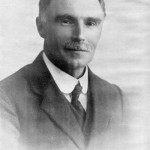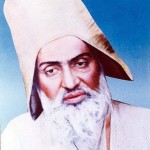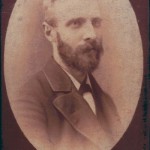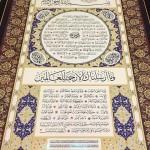-
CHAPTER X: The House of Islam (novel extract)
By M. Marmaduke Pickthall
Categories : British Muslim Heritage
After the success of his Saïd the Fisherman, Pickthall was emboldened to attempt a novel set entirely in the Middle East. The plot is set during the reign of Sultan Abd al-Majid, and concerns a saintly scholar, Shems-ud-dín, who comes to Jerusalem to find a European doctor for Alia, his desperately-ill daughter. This entails both a tussle with his own religious pride, and a difficult encounter with his son, who has risen to high office in the local Ottoman administration.
CHAPTER X
The sun rode high above the Holy City, but a freshness of the dawn still lurked in the shade of her rough walls, in the gloom of her covered ways, which swarmed with people in all kinds of raiment representative of every nation under heaven. To any one threading that crowded labyrinth of whitish stone, ancient and coherent, glimpses of the pure blue sky became welcome as a flower on rocks. For Shems-ud-dín, accustomed through so many years to wide horizons and an open road, the overshadowing walls made a prison. The hubbub of the bazaars dazed him, and he felt hurt by the careless shouldering of other wayfarers.
He had been to visit Alia, and was making his way, under guidance of the faithful Zeyd, to the Sacred Area, when he met Shibli walking with Hassan Agha and his attendant Circassians amid the throng in a long, dim market.
‘How is the health of our dove this morning?’ cried Hassan, speaking for them all. ‘In sh’ Allah, the poor one is much better/‘
‘If not better, her frame has rest – for which Allah be praised!’ returned Shems-ud-dín. ‘The people of the house are very kind, as I learn from the mouth of Mâs. The Lord reward them! … O Shibli, son of my hope, unless thou hast some grave business, come with me to the Dome of the Rock, whither I go to pray. It is long since I spoke with thee in private. Come and let thy voice comfort me, O my dear.’
Shibli obeyed, as in duty bound; but his face often turned to gaze wistfully after the Cricassians, and the lines of his mouth expressed grievance.
‘Is the health of the beloved indeed no better?’ he felt it incumbent on him to ask.
‘I know not how to answer thee, O my son. I fear hope as a friend untried. It is enough to desire. Notwithstanding, if Allah wills that she be made whole, there appears to my mind a possibility which yesterday I could not discern.’
‘Praise be to Allah!’ murmured Shibli, very properly.
The quiet of the Muslim quarter brought refreshment to Shems-ud-dín, after the clamour of the motley throng in the bazaars. Old walls rose high on either hand. Jutting lattices, with here and there an arch, encroached on the jewel sky. In the shade of one ancient portal, ornate but crumbling to decay, sat a breadseller asleep behind two tiers of flat, brown loaves. A man with a water-skin on his back turned in at the doorway of a house before them. A grave notable, in apparel sober but rich, passed them without a glance, one hand in his breast. Everything in that dim, once splendid quarter told of a proud reserve, of a dignity that needs no trump for its assertion. The air was sad with the sadness of great things past.
They entered what seemed a disused bazaar of rare magnificence, a huge corridor with a lofty vaulted roof, which got light from the far end where its tall arch framed the sky. The place was deserted and ruinous, its floor uneven and strewn with the brash of masonry. Shems-ud-dín quickened step instinctively to gain the light which picked out the faces of his companions from the shades wherein they had walked so long.
The outer sunshine crashed on their sight with the splinter of a thousand lances. The great mouth of the passage yawned black as night behind them. On either side of it ran a high irregular wall, bearing here and there a lattice, the end of the houses in this direction. They stood on a strip of clear ground, on which a few old trees cast blots of shadow; a place waste save for patches of wrought pavement and certain small, domed shrines as delicate as toys of ivory.
Before them, at no great distance, rose a flight of wide steps leading up on to a terraced plateau, and at a point further off up sprang a sister flight exactly similar. On the top of either stairway, in the gate of the Haram, stood three slender columns, light and graceful as flower-stems, supporting arches. At one end of the plateau, seen through cypress trees, crouched a mosque of many aisles; and numberless small, domed buildings – shrines and cells and pulpits – capped the terrace walls. But what drew and absorbed their gaze to the forgetting of all else, the sun and centre of all, was a mighty dome, in form and colour somewhat resembling a ripe fig, springing from the roof of an octagon of two kinds of marble, wrought together into cunning patterns. Not a foot of the great building but had been treated minutely, curiously, by the hands of forgotten craftsmen. In the full light of morning, there in that sand-hued place, it bloomed a wondrous iris of the hills, a thing to wring a shout from the dying.
Even Shibli forgot his dudgeon, and joined reverently with Zeyd ebn Abbâs in reciting the prayer of first approach, after Shems-ud-dín.
Then, having gazed all about them, they crossed the waste ground and mounted the steps. Discarding slippers, they passed along a time-worn pavement to the place of washing. With the exception of two middle-aged men in dark robes and white turbans, who sat disputing gravely beneath a tree and gave but one look to the pilgrims, they seemed alone in the vast enclosure.
When, having purified their bodies, they ventured to approach the Noble Sanctuary, Shems-ud-dín thought well to remind them of its claims to reverence.
‘Within, beneath this admirable dome,’ he said, ‘we shall behold the rock whereon Neby Ibrahim, the Friend of God, prepared to sacrifice his beloved son Ismail, at the bidding of the Most High. Hither also, in an after age, was our lord Muhammed, the Apostle of God, borne by night on the celestial beast, Burac; and from that same rock was he transported to the seventh heaven, being yet mortal. Surely there is no stone in all the world save only that of Mekka, more worthy of our reverence than this rock, which God has hallowed from of old. And the Khalif, Omar El Khattab (peace to him!), did well to raise this splendid dome above it.’
Zeyd ebn Abbâs devoured those high words greedily. Shibli heard them with respect. At the entrance to the Dome of the Rock Shems-ud-dín ceased speaking, and they passed into the tinted gloom of the sanctuary.
While Shibli and Zeyd ebn Abbâs paced the ring of pavement, studying the texts worked in mosaic upon the walls and above the arches looking on the natural rock so gloriously enshrined, Shems-ud-dín knelt and made prostration, praying –
‘O Allah, pardon! Grant to thy servant faith on the pattern of El Khalil, who in this place offered his dearest freely unto thee. Am I not the very opposite of Neby Ibrahim El Khalil? When all reasonable means failed to restore my child, and prayer had been made in vain, Thy Will was manifest to me. Yet I presumed to seek other aid, I sought to procure her health by man’s exertion. I followed the contrivance of my own mind. Am I not impious, therefore? Am I not abominable? What am I that Thou shouldst hear me, or my deeds upon the earth to make a claim upon Thee? Nevertheless, Thou deignest to give ear to the prayers of men, and hast ordained prayer unto us as an offering pleasing in Thy sight. Hear me, O Lord, in this my extremity! Oh, have mercy on my daughter, the innocent; and smite me rather, for I am sinful! And whatever Thy Will concerning her, teach me to resign myself to it utterly. Subdue my mind and my soul, and lead me in the way of the upright.’
He rose at length from off the pavement, and went and sat cross-legged, his back against the wall. Tears blinded him. The footsteps of Shibli and Zeyd echoed in the vast dome, and their whispering made a hollow murmur. But Shems-ud-dín heard nothing save the clamour of his inward strife.
All at once a voice near his ear said, ‘Why weepest thou, O my brother?’
With a start, as one awakes out of sleep, he looked and beheld one in flowing raiment standing before him, a very old man who leaned upon a staff. His face was deeply furrowed where the white hair grew not, and his lips were shrivelled and sucked inward as when the gums beneath have shrunken, being toothless. Shems-ud-dín sat amazed by the apparition, for he had not heard the old man’s steps approaching nor the tap of his staff along the stones. He saw the forms of Zeyd and Shibli afar off, standing watching as men smitten with dismay.
‘What ails thee, O my brother? Wherefore weepest thou? I cannot discern thy likeness, for my eyes grow dim; but I see thy beard white as my own, and I hear thy sobs. What dire distress is thine, an old man inured to human griefs, that thou so lamentest?’
‘A long story, O my brother.’
‘A long story is the best of stories, and I like it none the worse for promising to be sad. At my age one is impatient only of abruptness, the inconsequence of the merry and light-minded. Lend me the help of thy hand, O my brother, that I may compose my limbs to sit beside thee.’
Shems-ud-dín reached forth his hand and the old man grasped it, steadying himself therewith while he tucked his staff beneath his left elbow. He was about to subside upon the bare stones, when Zeyd ebn Abbâs darted forward and spread his ragged cloak upon the ground beneath him. The old man smiled vaguely, exposing his toothless gums.
‘May Allah requite thee, O my son! May this thy courtesy be counted to thee for righteousness! Thy cloak is old and of poor material, as my hands perceive. May a rich mantle fall upon thee from the hands of Allah!’
Zeyd bowed his head to the blessing, and rejoined Shibli with a face of great elation.
‘Now deign to impart thy story, O my brother!’ said the old man, when fairly seated.
Shems-ud-dín complied straightway. He abated nothing of his own frowardness, but confessed it throughout the story, speaking much of his soul’s uneasiness on that account.
At the end, there was silence for a little space. Then that old man spoke.
‘During all the years that I have been Chief of the Learned in this place, never – Allah witness! – never heard I such a tale as this thou hast related. Beloved, I see not with thy eyes; I see goodness everywhere in thy conduct, save only in the one point of thy recourse to the unbeliever, of which thou madest nought in the telling. This Frank is not an infidel like another infidel. He is of those who openly oppose the faith. Is there not a corân concerning such an one: “The worst beasts in God’s sight are those who are obstinate unbelievers”?’
‘But, on the other hand, there is also this corân: “Allah is our Lord and your Lord; unto us our works, and unto you your works; no quarrelling between us and you; for Allah will gather in us both, and unto Him we shall return.”’
‘Good. But that word is abrogated in the judgement of all the learned!’
‘Not of all, by thy leave! There be many who assert that no word from Allah can be rendered null, that this has its season, and that its season, but all are eternally valid. I was ever of the party of these last. As to the degree of intercourse permissible with unbelievers, and more especially with the People of the Book, it is nowhere fixed for us. I could quote a hundred traditions in support of either argument, and the best precedents are in like manner at variance. For instance, if we refer to the Sûnna – ’
‘Stay! Hast thou studied the Sûnna?’
‘Assuredly; and all our commentators and, I verily believe, every scripture relevant to the subject.’
‘O happy day for me! Welcome, and again welcome, O my soul! Deign now to dispute a little! It is seldom I can exercise my learning; very seldom I am able to confer with a man like thee. The lamp of knowledge does but smoke nowadays.’
It was long since Shems-ud-dín had enjoyed conversation with his equal in learning. The two sheykhs held long conference, while Zeyd sat on his heels watching them, and Shibli wandered to and fro, yawning frequently and viewing the wonders about him with a growing disenchantment.
At last the old man rose by the help of Shems-ud-dín and the attentive Zeyd. He said –
‘My peace on thee! Thou art a prince of scholars, and a man most righteous. If I perceive any fault in thee, it is that thy mind exalts small matters, and overlooks or belittles points of real importance – a common failing among us learned in the Law, professed quibblers. This matter of thy going to the Frank is, to my thinking, no trifle. I hope to convince thee of the wrong in it at some other time. Come hither whenever thou art so minded, it is a boon I crave of thee. Ask for Mahmûd Ali, which is my name. And if ever thou desirest to pray alone, there stand cells enough within our precincts, empty, for the most part, save in Ramadân, which is not yet. They and all I dispose of are thine to use, O my soul’s brother!’
With a parting benison the old man hobbled away, bowed upon his staff.
Shems-ud-dín said one last prayer, then went out with his companions into the blinding sunlight.
Zeyd, the son of Abbâs, raised his hands on high, towards that sapphire dome which has the world for pavement. In a loud voice he praised Allah, and blessed the day on which it had been given him to witness the meeting of two most holy men, and garner in his imagination a drop of two of the celestial wisdom that had gushed in rivers from their mouths.
Shibli drew breath of relief, and looked upon the heaped-up, whitish city with a lover’s eyes.
(London: Methuen, 1906).






